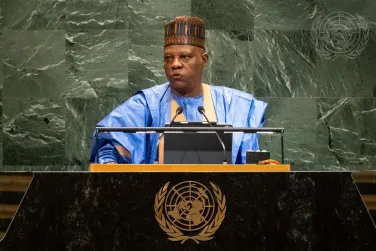Vice President Kashim Shettima has urged the African Union (AU) to renew its commitment to diplomacy as the foremost tool for conflict resolution in Africa. Representing President Bola Ahmed Tinubu at the AU Peace and Security Council meeting, held on the sidelines of the 80th United Nations General Assembly (UNGA) in New York, Shettima emphasized that external interference undermines the continent’s security policy and the principle of common defence.
Addressing the Council, the Vice President highlighted the successes of AU Peace Support Operations (PSOs) in maintaining peace across Africa but cautioned about their heavy financial burden. He stressed that peace operations must go beyond enforcement to include diplomatic and political strategies capable of addressing the root causes of conflict.
“Our continent must continue to maintain a diplomatic approach in its conflict prevention and resolution endeavours,” Shettima said, urging the AU to empower national and local institutions to anticipate shocks, manage tensions, and build resilient peace infrastructures.
He also warned against the proliferation of multiple peace initiatives, which, he argued, dilute AU-led processes, and called for an immediate and unconditional withdrawal of foreign military forces, mercenaries, and contractors from member states.
Shettima further urged the Council to expedite the operationalisation of the African Standby Force, noting that stronger coordination and strategic engagement with regional economic communities would enhance conflict prevention. “Working in silos should be avoided completely. The AU has adequate mechanisms for addressing the ever-changing conflict dynamics on our continent,” he added.
In his remarks, Mr. Parfait Onanga-Anyanga, Special Representative of the UN Secretary-General to the AU, echoed Shettima’s concerns, stressing that peace must begin at the national level and urging African countries to build robust internal mechanisms for conflict prevention.
Education as a Pathway to Peace
In a related engagement, Vice President Shettima described education as the most rewarding public investment, with the power to curb fragility, reduce poverty, and address youth unemployment. Speaking at a high-level event co-hosted by the Permanent Missions of Nigeria and Italy, along with the Global Partnership for Education (GPE), Shettima stressed that every additional year of schooling significantly boosts lifetime earnings and reduces vulnerability to conflict.
He praised GPE’s innovative financing model, which mobilises resources and co-financing to multiply impact. In 2024 alone, GPE approved more than US$1.2 billion in new grants and mobilised an additional US$1.5 billion in co-financing.
“A notable GPE grant in Nigeria is helping us to integrate children from religious schools into mainstream education and train teachers across states, especially to support girls’ education,” Shettima noted.
The Vice President called on global donors to increase predictable funding for education, prioritise flexible resources for system strengthening, and scale up initiatives like girls’ education accelerators. He reiterated Nigeria’s commitment to working with partners to ensure that the GPE 2030 agenda becomes a transformative turning point for children worldwide.
By linking conflict resolution with education, Vice President Shettima underscored the importance of diplomacy, unity, and human development as essential pillars for Africa’s stability and prosperity.



